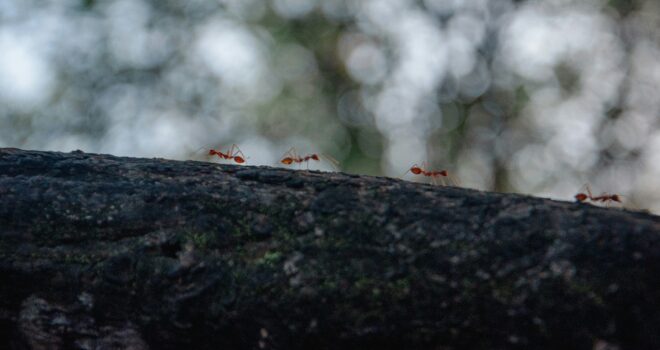I was relaxing in the sun, enjoying the warmth that Old Sol generously provides. I say “relaxing” in the sense that I am not doing anything in particular. My mind, however, seldom, if ever, relaxes. I spotted a tiny ant scurrying across the concrete pavement. It seemed to know where it was going and what it would do when it got there. I admired its energy. Such a tiny thing and yet it has purpose and the desire to go on living. It pleased me to witness one of God’s creatures going about its work which, to it, is the most important thing in the world. God bless this tiny creature for doing exactly what its Creator wills it to do.
Ants first appeared on earth between 140 and 160 million years ago during the Jurassic Period when dinosaurs roamed the land. That would have given them enough time, according to evolutionist Charles Darwin, to change into a higher species. What that higher species might be is difficult to imagine. And yet, after this considerable amount of time, ants are still ants. Do they need a few more million years to evolve beyond their anthood? We will never know for sure. But my guess is that they will still be ants.
What the specialists (they are called myrmecologists) do know is that their extinction would prove catastrophic, for they are essential for soil aeration, fertilization, and ecological balance. If they could listen to us, we should say to them, “Please stay as you are, do not evolve, your work is very important to us.” But they do this anyway and have been doing it without complaining for untold millions of years.
Anteaters have been around for about 25 million years, and they, too, are still anteaters. But they have done very little to reduce the world’s population of ants. Ants and anteaters are, so to speak, “conservative,” and have done a good job in avoiding progress. God anticipated the anteaters need for ants millions of years before they came into being. That is called being Provident.
According to Darwin, evolution is possible because a living organism changes, one step at a time, due to a variety of extrinsic factors. Let us go along with the great evolutionist and imagine a monkey slowly undergoing small changes until it is finally transformed into a human being. Let us say, then, that this new species, the product of untold years of evolution, is a male. Presumably, it would take as much time for a female to arrive. By that time, however, the male would have long since vanished from the planet. It would be unlikely, according to Darwinian principles, for the newly evolved being to be a male since it is only too clear that the male is ordered in a complementary fashion to the female who, at the time, did not exist. Darwin does not explain why an evolved being requires another being, one that is wholly independent, for its completion. He does not explain how two separate beings could evolve that are profoundly related to each other. If he had a sense of humor, he could have said, “It’s just like a woman to be late.”
Darwin, who knew absolutely nothing about micro-biology, taught that beings evolve one step at a time. There are some biological facts, however, that never entered his mind. A 10-year old boy is composed of 28 trillion cells. To make things even more mind boggling, each cell contains 46 chromosomes arranged in pairs of two. Then, his body must integrate another 8 trillion cells for him to become a full-fledged adult male. The immune system contains 100 billion immunological receptors. And so on. None of this can be explained by a one-step-at-a-time process.
We may go a little further, concerning the prodigious and prolific nature of the human being. In order to stay healthy, 10 billion white cells and 400 billion platelets need to be produced in an individual on a daily basis. Scientists know a lot more about biology than Darwin did in 1859 when he wrote, On the Origin of the Species. The plain fact is that he failed to discover the origin of any species. Furthermore, the full title of his masterpiece proved that he is just as ignorant about social justice as he was ignorant about biology. The full title of his famous work is, On the Origin of the Species, or the Preservation of Favored Races in the Struggle for Life.
I do not think that Mother Angelica spent much time studying Darwinian evolution. She had heard, as most of us have, the notion that monkeys evolved into humans. “Why, then,” she said, “are there still monkeys?” She also could have said, “Why are there still ants and anteaters?” The question would have annoyed Darwin. He would have countered by stating that evolution takes place in a single organism and not every individual in the entire species at the same time. Okay, but the holy nun has a point. If a single monkey evolved into a single human, how then could that human procreate?
Mother Angelica’s acceptance of Genesis puts her far ahead of Darwin’s theory of evolution. Darwin tried hard to exclude the Creator, and explain life in terms of chance. Yet chance cannot begin to explain the magnificent order that is found everywhere in the universe. Try as he may, the evolutionist cannot do away with God. We leave the final words to that paragon of common sense, G. K. Chesterton: “It is absurd for the Evolutionist to complain that it is unthinkable for an admittedly unthinkable God to make everything out of nothing, and then pretend that it is more thinkable that nothing should turn into everything.”
Photo by Yanuka Deneth on Unsplash











